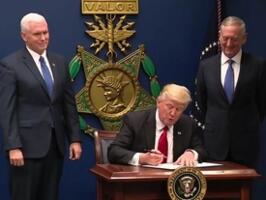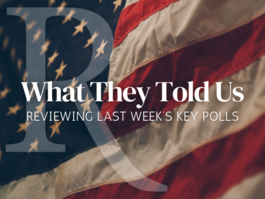An Unfond Farewell to Un-statesman Orrin Hatch By Michelle Malkin
The longest-serving Republican senator in U.S. history announced this week that he will finally, finally, finally, finally, finally, finally, finally retire.

The longest-serving Republican senator in U.S. history announced this week that he will finally, finally, finally, finally, finally, finally, finally retire.

What caused the FBI to open a counterintelligence investigation into the Trump campaign in July 2016, which evolved into the criminal investigation that is said today to imperil the Trump presidency?

President Trump is up 3 percent!
I refer to the betting odds. Gamblers (mostly in Europe because political bets are legal there) now give the president a 53 percent chance of finishing his first term.

Nearly half of Democrats think there’s a good chance President Trump won’t make it to the end of his first term in office, but two-out-of-three Republicans see four more years in Trump’s future.

When tracking President Trump’s job approval on a daily basis, people sometimes get so caught up in the day-to-day fluctuations that they miss the bigger picture.

While more than half of Americans are feeling good about 2018, they aren’t as high on the upcoming year as they have been in recent years.

Forty percent (40%) of Likely U.S. Voters now think the country is heading in the right direction, according to a new Rasmussen Reports national telephone and online survey for the week ending December 28.

It’s officially 2018, but Americans don’t consider New Year’s Day all that important.

What if Hillary Clinton had won 114,000 more votes in four key states? Or, what if she'd picked up the two to three percent of the vote she lost because Bernie Sanders' supporters sat on their hands on election day? She'd be "Clinton 2" or "Clinton 45" or "the second President Clinton" -- and the world would look very different.

What has been perhaps the most tumultuous year in American politics since the Clinton administration is ending this week on a positive note for the Trump administration and most Americans.

016 turned out to be a year in which it was wise to take Donald Trump as a political candidate seriously but not literally, in the inspired words of syndicated columnist Salena Zito. As 2017 is on the point of vanishing, it's worth asking whether it's time to take Trump seriously, if not literally, as a maker of public policy.

Americans feel better about 2017 than they did the year before, a reflection perhaps of the record-setting level of economic confidence at year’s end.

Looking back on President Donald Trump’s first year in office, he has compiled a shockingly strong record and long list of accomplishments. As was also the case with his rise to the presidency, President Trump has broken several records for a first-year commander-in-chief and fulfilled many of his key campaign promises.

Americans will be welcoming the new year from the comfort of their own homes, though many will be sharing a kiss, too.

Asked what he did during the French Revolution, Abbe Sieyes replied, "I survived."

Voters remain strong believers in the development of new energy sources and U.S. energy independence, but support for further gas and oil development continues to fall.

Americans aren’t as determined to start 2018 off on a new foot as they were to start 2017.

Congressional Republicans have finally succeeded – after more than 35 years of debate - in authorizing oil drilling in Alaska’s Arctic National Wildlife Refuge (ANWR) even though more voters than ever are opposed.

There are talkers and doers, sowers of dissatisfaction seeds and agents of lasting change. Much of my column work over the year is dedicated to exposing the worst crapweasels in politics, pop culture, media and the policy arena. But to ring out 2017, I'm raising a toast to some of my favorite bulldogs -- vigilant citizens, independent journalists and bloggers, and dedicated activists who work tirelessly to protect life, liberty and the pursuit of happiness.

With President Trump's signing of the big tax cut bill, the Republican Party snatched victory from the jaws of defeat. Suddenly, the political and economic landscapes have changed. The GOP has turned the tables on the Democrats.